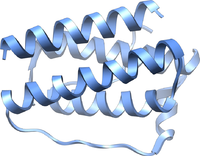
Photo from wikipedia
Background Ketogenic diets have been used to treat both obesity and neurological disorders, including epilepsy and more recently Alzheimer’s disease (AD), likely due to favorable effects on both central and… Click to show full abstract
Background Ketogenic diets have been used to treat both obesity and neurological disorders, including epilepsy and more recently Alzheimer’s disease (AD), likely due to favorable effects on both central and peripheral metabolism. Improvements in body composition have also been reported; however, it is unclear if diet-induced changes in adiposity are related to improvements in AD and related neuropathology. Purpose We examined the effects of a Modified Mediterranean Ketogenic (MMK) diet vs. an American Heart Association (AHA) diet on body weight, body composition, and body fat distribution and their association with cerebrospinal fluid (CSF) biomarkers in older adults at risk for AD. Methods Twenty adults (mean age: 64.3 ± 6.3 years, 35% Black, 75% female) were randomly assigned to a crossover trial starting with either the MMK or AHA diet for 6 weeks, followed by a 6-week washout and then the opposite diet for 6 weeks. At baseline and after each diet adiposity was assessed by dual-energy x-ray absorptiometry and CSF biomarkers were measured. Linear mixed effect models were used to examine the effect of diet on adiposity. Spearman correlations were examined to assess associations between adiposity and CSF biomarkers. Results At baseline there was a high prevalence of overweight/obesity and central adiposity, and higher visceral fat and lower peripheral fat were associated with an adverse CSF biomarker profile. The MMK and AHA diets led to similar improvements in body composition and body fat distribution. Significant correlations were found between changes in adiposity and changes in CSF biomarkers (r’s = 0.63–0.92, p’s < 0.05), with notable differences by diet. Decreases in body fat on the MMK diet were related to changes in Aβ biomarkers, whereas decreases in body fat on the AHA diet were related to changes in tau biomarkers and cholinesterase activity. Interestingly, increases in CSF Aβ on the MMK diet occurred in those with less fat loss. Conclusion An MMK diet leads to favorable changes in body composition, body fat distribution, and CSF biomarkers. Our data suggest that modest weight loss that maximizes visceral fat loss and preserves peripheral fat, may have the greatest impact on brain health. Clinical Trial Registration [www.ClinicalTrials.gov], identifier [NCT02984540].
Journal Title: Frontiers in Neuroscience
Year Published: 2022
Link to full text (if available)
Share on Social Media: Sign Up to like & get
recommendations!